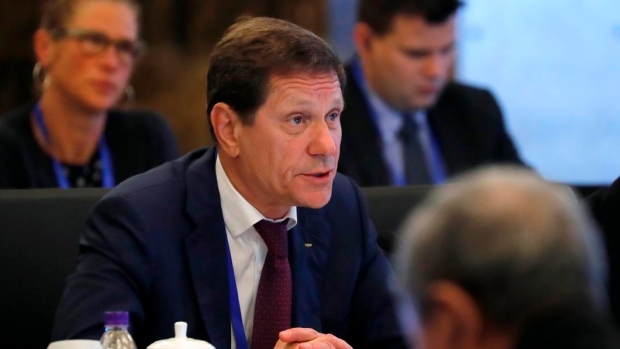Sep 14, 2017
Anti-doping group wants Winter Games ban of Russian leaders
If the Russians are worried about missing the upcoming Winter Olympics, one of their key leaders certainly isn't showing it. Alexander Zhukov, a Russian member of the International Olympic Committee, told The Associated Press "all of them are going to Pyeongchang."
The Canadian Press

LIMA, Peru — If the Russians are worried about missing the upcoming Winter Olympics, one of their key leaders certainly isn't showing it.
Alexander Zhukov, a Russian member of the International Olympic Committee, told The Associated Press "all of them are going to Pyeongchang" when asked this week if he had any concerns about how the doping investigation in his country might affect eligibility for the Olympics next February.
"Most of the Russian athletes are training in major competitions" this winter, said Zhukov, who also serves as head of Russia's Olympic committee. "And they're preparing. I understand all of them are going to Pyeongchang."
Zhukov's confidence comes as a pair of IOC committees head into their 15th month of reviewing the findings of an investigation conducted by Richard McLaren. That probe found evidence of widespread, state-sponsored doping corruption inside Russia that impacted 1,000 athletes covering 30 sports.
At its meetings this week, the IOC will receive updates on those reports, one of which was to include reanalysis of 254 urine samples. But there are no plans to decide either about individual Russian athletes or the country's eligibility as a whole.
That feels like a delaying tactic to some of the IOC's own members, along with a group of anti-doping leaders who on Thursday called for a ban of the Russian Olympic Committee at next year's Games.
"It wouldn't surprise me at all if the fix is in already, just like in Rio," said Travis Tygart, the CEO of the U.S. Anti-Doping Agency, who was among those calling for the ban. "We're right back in the same situation, where even if the evidence is a slam dunk, they're not going to have time to make it have any meaningful consequence."
The IOC stopped short of a full ban of the Russian athletes at last year's Summer Games, instead giving international sports federations a handful of days to determine eligibility of individual athletes. It sent the wrong message and should not be repeated, according to IOC member Dick Pound, who conducted a separate investigation into doping corruption inside the Russian track team that came up with similar conclusions as the McLaren Report.
"It's our event, for (goodness) sake," Pound told AP. "We're the ones who have to establish that it's credible, and we have to be credible. We missed a huge opportunity in Rio."
Pound and the anti-doping leaders agree that there should be a system in place for Russian athletes to compete as neutrals if they can show they've been subject to a credible anti-doping regimen over the past several months. Last month, 19 Russian athletes competed at world track and field championships under those circumstances.
Adding to the frustration of the anti-doping leaders was news this week that the World Anti-Doping Agency dismissed all but one of the first 96 individual cases to stem from the McLaren Report, due to lack of evidence.
WADA director general Olivier Niggli told AP that because part of the Russian doping scheme involved getting rid of positive samples, proving some of the cases will be difficult.
"Since the beginning, we have repeatedly said that the evidence on the individual athletes is what it is, and that many of these cases will not have enough evidence to be prosecuted," Niggli said. "If we have enough evidence to go forward, we will have no hesitation. But you have to be realistic."
WADA officials said they believe the sports federations, which are the first to review the cases, will go forward with a number of them.
Earlier this week, Russia's deputy prime minister, Vitaly Mutko, blamed the fired head of Russia's anti-doping lab along with Russia's anti-doping agency for breaking rules that led to the findings in the McLaren Report.
WADA, the international track federation (IAAF) and the International Paralympic Committee are requiring that Russia accept responsibility for state-sponsored doping as a condition for reinstatement of the organizations they oversee. The IOC, however, has set no such requirement. President Thomas Bach, who spearheaded the move to keep Russia eligible for Rio, has said he's withholding judgment until the committee reports are complete.
In the meantime, a group of athletes, led by Olympic cross-country skier and WADA member Beckie Scott, are working on a Charter of Athlete's Rights that would serve as a formal document to "address the athletes' call that their rights be protected," Scott said in a statement.
But the clock is ticking. The Olympics start in fewer than four months. Bach said he's hoping some decisions on individual cases will be made before the winter sports season starts in earnest.
